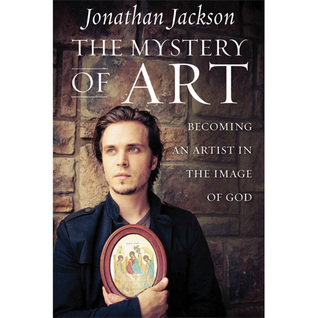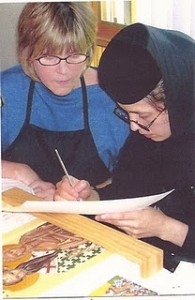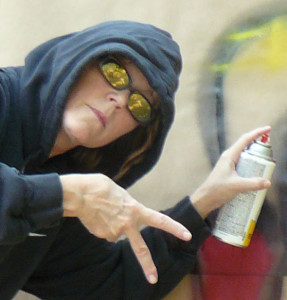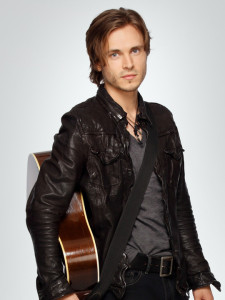 I’ve been reading the book my husband gave me for Christmas this week. (It finally made its way up the queue.) The book is The Mystery of Art: Becoming an Artist in the Image of God by Jonathan Jackson. Five time Emmy-award-winning Jackson first caught my attention because he’s an actor—he plays Avery Barkley, an up and coming musician, on the TV show “Nashville.” Jackson began his career over twenty years ago on the soap opera General Hospital, and he’s been in many feature films, most notably The Deep End of the Ocean, Tuck Everlasting, and Insomnia (with Al Pacino). He’s also lead singer in the band Enation. He and and his wife and three children are active members of an Orthodox Church in Franklin, Tennessee.
I’ve been reading the book my husband gave me for Christmas this week. (It finally made its way up the queue.) The book is The Mystery of Art: Becoming an Artist in the Image of God by Jonathan Jackson. Five time Emmy-award-winning Jackson first caught my attention because he’s an actor—he plays Avery Barkley, an up and coming musician, on the TV show “Nashville.” Jackson began his career over twenty years ago on the soap opera General Hospital, and he’s been in many feature films, most notably The Deep End of the Ocean, Tuck Everlasting, and Insomnia (with Al Pacino). He’s also lead singer in the band Enation. He and and his wife and three children are active members of an Orthodox Church in Franklin, Tennessee.
When I learned that Jackson was Orthodox (like me) I was intrigued and immediately became a fan of “Nashville.” The Mystery of Art has only increased my respect for him as an artist—musician, actor and writer. He grapples with so many of the same things that fill my reflective hours. From the Introduction:
Is the life of the Christian antithetical or complementary to the vocation of an artist? Are they hostile to one another or deeply connected? The purpose of this book is to open a dialogue between the Christian Soul and the mystery of art.
 About twenty years ago I was in what I’ve come to call my “radical convert” spiritual phase. For several years I cut myself off from “the world’s” culture—from television, movies, and secular literature and art. I had become convinced that these things were dangerous and counter to my purpose as an Orthodox Christian. But the artist inside was screaming to get out of the prison in which I had placed her. My only outlets for those desires were “Christian” art (I became an iconographer) and writing (I published our church newsletter and wrote and directed children’s Christmas plays.) The only music I listened to was liturgical—mostly the Byzantine and Slavonic music of my church.
About twenty years ago I was in what I’ve come to call my “radical convert” spiritual phase. For several years I cut myself off from “the world’s” culture—from television, movies, and secular literature and art. I had become convinced that these things were dangerous and counter to my purpose as an Orthodox Christian. But the artist inside was screaming to get out of the prison in which I had placed her. My only outlets for those desires were “Christian” art (I became an iconographer) and writing (I published our church newsletter and wrote and directed children’s Christmas plays.) The only music I listened to was liturgical—mostly the Byzantine and Slavonic music of my church.
 Once I came out of that radical phase of my life I made several abrupt changes. I quit writing icons (I wrote about that here.) I began to listen to secular music. I dabbled in abstract art. And I began writing seriously. Over the next eight years I published a dozen or more essays—three of which appear in anthologies. I wrote four book-length manuscripts—one of which I’m now revising for publication. And I fell in love with the art of acting. Not for me (my last dramatic performance was in our high school’s production of Our Town back in 1967) but for the enjoyment of watching the artists bring the stories to life on television and in the movies. I appreciate the writing of those stories as much as the acting.
Once I came out of that radical phase of my life I made several abrupt changes. I quit writing icons (I wrote about that here.) I began to listen to secular music. I dabbled in abstract art. And I began writing seriously. Over the next eight years I published a dozen or more essays—three of which appear in anthologies. I wrote four book-length manuscripts—one of which I’m now revising for publication. And I fell in love with the art of acting. Not for me (my last dramatic performance was in our high school’s production of Our Town back in 1967) but for the enjoyment of watching the artists bring the stories to life on television and in the movies. I appreciate the writing of those stories as much as the acting.
Jackson talks about the spiritual life throughout this wonderful book, making it clear from the beginning that “the true artist within must be the Holy Spirit.” He talks about the power of the artist to affect culture (as opposed to running away from it, as I did):
Politicians can write as many laws as they wish, but they will never change the heart of the culture. This belongs to the artists—and we do battle in the heart for the soul of society…. An artist is one of the caretakers of the spiritual health of humanity.
He explains that this power can be used for good or for evil:
Producing films in which pornography is depicted in a comedic manner or in which the systematic slaughter of innocent people is glorified changes the culture. The artist is placed within this cultural dynamic to bring about the return of the prodigal world to the beauty of life.
That’s a high calling. But one I’m listening to as I work on revisions to my novel. There are sections which the editor (and a couple of trusted early readers) felt are too graphic/explicit. I didn’t create those scenes (of sexual abuse) to distract the reader from the story, but evidently they do. As I revise them now I’m keeping in mind Jackson’s words:
The artist is not a prude or a fundamentalist—he is not afraid to show the depths of darkness or the honesty of life. But when he is called to portray the ugliness of humanity, he will not glorify it…. He will weep as he paints and tremble as he sings. The spiritual artist will pray for the life of the world as he portrays its desperate need for healing.
Wow. I know I’m quoting a lot here, but his words are inspiring me even as I type them:
When he creates, the artist seeks to transform the atmosphere. He seeks to affect the heart and infuse the mind with glimpses of beauty and darkness.
 Glimpses of beauty and darkness. I can do that. I can chose to use my art to glorify God and His creation rather than glorifying sin and suffering. And although Jackson agrees with the common thinking that most artists are somewhat mad, he says that the artist has a choice:
Glimpses of beauty and darkness. I can do that. I can chose to use my art to glorify God and His creation rather than glorifying sin and suffering. And although Jackson agrees with the common thinking that most artists are somewhat mad, he says that the artist has a choice:
Will he create for the glory of his small story or for the eternal glory of God? Will his art be an offering for his own ego—or for the life of the world?… Story is man’s participation in the brilliance of God.
I’m only half way through with this book, so this isn’t a full “book review,” and I’m sure I will discover more wisdom and inspiration in the second half. I’ll close today with one more nugget:
The artist must transcend, or he will die…. Everyone, whether in joy or sorrow, imagination or intellect, wisdom or naivety, holiness or nirvana, crucifixion or law, all must break through some shadow or wall, look beyond, above, or within… gaze past a visible horizon, an altar, or a trend, wound something, tear something, or mend… all must become something in the end…all must transcend.
“The artist must transcend or die…” Wow, did I need to hear that today. Thanks for sharing the wisdom of this seeker/seer.
You’re a channel today, Susan.
I’m grateful.